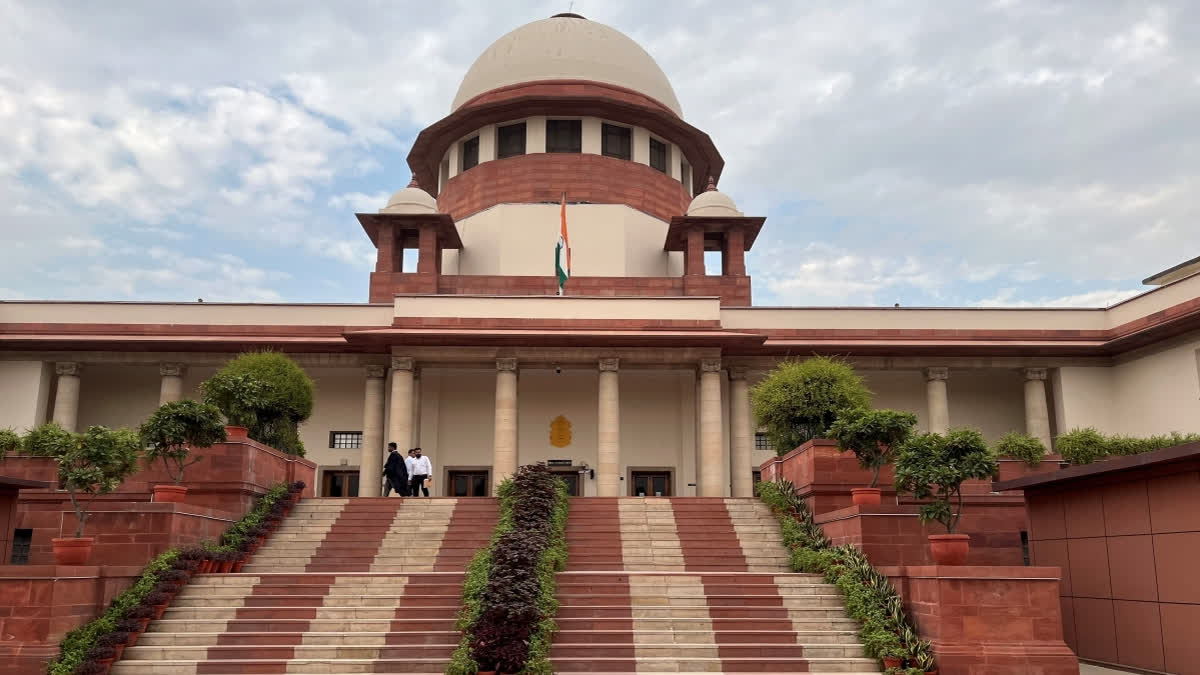New Delhi: The Supreme Court has said that the Enforcement Directorate can provide the grounds of arrest to an accused in a money laundering case within 24 hours.
A bench of Justices Bela M Trivedi and Satish Chandra Sharma said: “In our opinion, the person asserted, if he is informed or made aware orally about the grounds of arrest at the time of his arrest and is furnished a written communication about the grounds of arrest as soon as may be i.e as early as possible and within reasonably convenient and requisite time of twenty-four hours of his arrest, that would be sufficient compliance of not only Section 19 of PMLA (Prevention of Money Laundering Act) but also of Article 22(1) of the Constitution”.
The apex court also declared its 2023 judgment in the Pankaj Bansal case requiring the ED to explain the grounds of arrest in writing as a matter of course and without exception would be applied prospectively only.
The apex court said in Vijay Madanlal Choudhary (2022), it has been categorically held that so long as the person has been informed about the grounds of his arrest, that is sufficient compliance of mandate of Article 22(1) (a person is to be informed about the grounds of arrest) of the Constitution. Notably, separately a review petition against the Vijay Madanlal Choudhary judgement is pending before a three-judge bench.
The bench said that it was also observed that the arrested person before being produced before the special court within 24 hours or for remand on each occasion, the court is free to look into the relevant records made available by the Authority about the involvement of the arrested person in the offence of money-laundering.
The bench said there remains no shadow of doubt that the law laid down by the Three-Judge bench in Vijay Madanlal Choudhary case (2022) that Section 19(1) of the PMLA has a reasonable nexus with the purposes and objects sought to be achieved by the PMLA and that the said provision is also compliant with the mandate of Article 21(1) of the Constitution. “Any observation made or any finding recorded by the Division Bench of lesser number of Judges contrary to the said ratio laid down in Vijay Madanlal Choudhary (supra) would be not in consonance with the jurisprudential wisdom expounded by the Constitution Benches in cases referred above”, said the bench.
Justice Trivedi, who authored the judgment on behalf of the bench, said the Vijay Madanlal Choudhary judgment holds the field as on the date.
The court explained the legal position while rejecting a plea by Ram Kishore Arora, founder of real estate company Supertech, for applying the Bansal judgement retrospectively and declaring his arrest by the ED as illegal for not providing the grounds of arrest in writing.
The apex court said in Pankaj Bansal judgment, the court had used the word “henceforth”, meaning thereby furnishing grounds of arrest in writing to the arrested person as soon as after his arrest was not mandatory or obligatory till the date of the said judgment.
The apex court said the submission of senior advocate A M Singhvi for the appellant that the said judgment was required to be given effect retrospectively cannot be accepted when the judgment itself states that it would be necessary “henceforth” that a copy of such written grounds of arrest is furnished to the arrested person as a matter of course and without exception. “Hence non-furnishing of grounds of arrest in writing till the date of pronouncement of judgment in Pankaj Bansal case could neither be held to be illegal nor the action of the concerned officer in not furnishing the same in writing could be faulted with. As such, the action of informing the person arrested about the grounds of his arrest is a sufficient compliance of Section 19 of PMLA as well as Article 22(1) of the Constitution of India, as held in Vijay Madanlal”, said Justice Trivedi, in the judgment delivered on December 15.
During the hearing, Additional Solicitor General (ASG) S V Raju, representing ED, vehemently submitted that the decision in case of Pankaj Bansal was per incuriam, as the two-Judge bench in the said case had deviated from the position of law settled by the prior three-Judge Bench judgment in Vijay Madanlal Choudhary and Others vs. Union of India and Others with respect to the compliance of the provisions of Section 19 of PMLA.
Also read:



